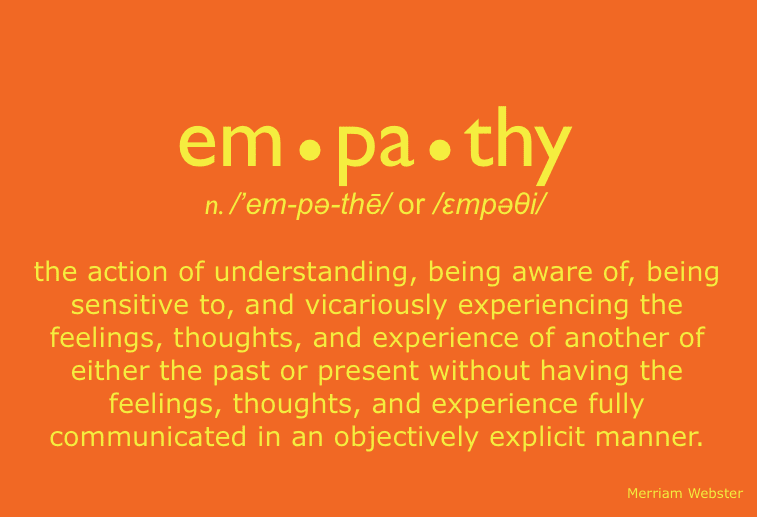People talk quite a lot about empathy as an important quality of modern leaders. There are blogs and sites vaunting its beneficial powers (See below for a good list of resources). The issue is that empathy is not a natural skill. It takes time to develop and hone. And, I would argue that one’s ability to show or experience empathy changes according to the person, the context and one’s state of mind.
Thus, empathy is something that may be in constant development. That takes effort and a certain myndset. For those of you not willing to make the effort, taking another tack, may I suggest this list is for you.

What empathy is not for!
Herewith the top 10 reasons why empathy may not be a good idea for business. I have added some pre-populated {tweet this} links to make it easier to tweet out certain phrases, if you feel like it!
- Being an Army General and sending soldiers to war, it is advisable not to have empathy. I guess that depends if you think business is warfare, and if your employees are soldiers?
- In a fear and control style of management, it is hard to torture people if you have empathy. {Tweet this} Taking a quote from RonBC at Notes from Underground, “[N]ow that various centres of empathy have been identified in the brain, evil can be tested by defining it as an absence of empathy.”
- When you have to cut costs and lay off people, empathy is not your best friend. {Tweet this} Cost killers don’t want to have to worry about the personal effects and collateral damage.
- It’s not advisable to be too empathetic to negotiate against someone else unless, that is, you think that understanding their motives is helpful.
- Without empathy, you won’t feel a need to provide a reason why when you give orders. Keeping your team motivated is not a primary concern. It is also said that it is easier to lie without empathy. Sociopaths are known for their lack of empathy. “A psychopath’s lack of empathy and guilt allows them to lie with ease – ‘they don’t see the value of telling the truth unless it will help get them what they want.'” From Catherine’s post “Without Empathy“
- Without empathy, you won’t need to understand why someone at work is upset at the beginning of the day, or needs to leave early in the afternoon. Your company culture privileges presenteesm (for example, everyone should always show up at work and work until the boss leaves). Concepts like distance work, flexible work hours are anathema to the company.
- Without empathy, you won’t find listening to clients complain very useful. {Tweet this}
- Without empathy, you might find social media a waste of time. {Tweet this} In fact, empathy takes time, too, so if you are a beast of efficiency then don’t go about worrying yourself with empathy. As the late Stephen Covey said, “Empathy takes time, and efficiency is for things, not people.”
- Without empathy, you are not going to be a good coach. Then again, what kind of leader needs to be a coach at work? If you are not worried about motivating your team or having them learn, then you certainly don’t want to waste your time with empathy.
- Without empathy, you will find it easier to outsource customer service and use an automated answering system.
How are you doing so far? Which reasons ring a bell for you?
On a personal level, I don’t know many successful happy marriages where both partners don’t have a developed sense of empathy. If, as a senior executive (or anyone else for that matter), the goal is also to live a fulfilling married life*, I would argue that empathy is a powerful asset on the home front. So, if being happily married is not important, you won’t have to worry about empathy, either. {Tweet this}
Further Reading: Empathy blogs and posts
- Culture of Empathy – led by Edwin Rutsch
- Jeremy Rifkin on TED: The Empathic Civilization
- The Limits of Empathy, NYT by David Brooks – a worthwhile read.
Favorite empathy quote
I end with a quote from Susan Sarandon: ““When you start to develop your powers of empathy and imagination, the whole world opens up to you.” The rest, I say, is up to you!
*Married or living together (i.e. long term partner whether or not married)











No empathy, no need to respect: people, deadlines, quality, etc… but, as everything in life, empathy is relative, and varies to your degree of willingness to do good. It has been well documented that cruel crimes are committed by people (prominently men) without an ounce of empathy.
point in case why the world is in absolute chaos right now under the menace Trump. Money before people!
thanks for mentioning the Culture of Empathy site Minterl.
I added your article to the Empathy Cafe Magazine
keep up the good work.. http://scoop.it/t/empathy-and-compassion
Also, perhaps we could do an empathy in business panel discussion around this?
Hi @Edwin,
Thanks for the mentions. Would be delighted to participate in a panel discussion! It might be interesting to think about the differences in how empathy is implemented across cultures, too? Is there are a difference? How might we proceed?
@Yendi: I learned loads about empathy thanks to the Women's Studies courses I took at Yale. Looking at history and literature through the eyes of women was, to coin a phrase, an eye opener! 🙂